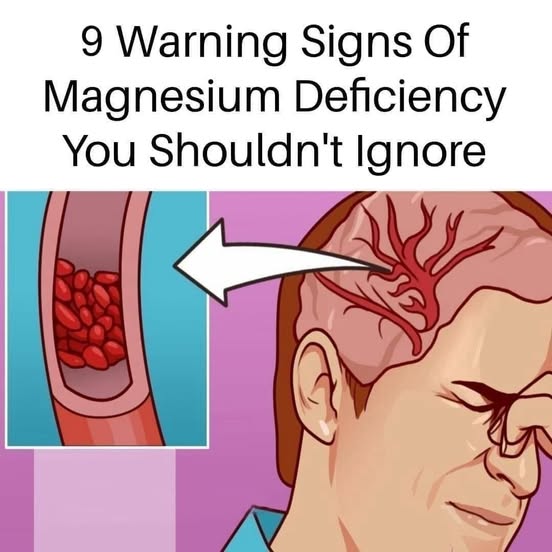Magnesium is a crucial mineral that plays a vital role in over 300 biochemical reactions in your body. Yet, many people unknowingly suffer from a magnesium deficiency, which can lead to a range of health issues. Here are 9 warning signs that you might not be getting enough magnesium, and why it’s important to pay attention.
1. Frequent Muscle Cramps and Spasms
What to Look For:
- Unexplained muscle cramps, twitches, or spasms
- Persistent leg or back cramps, especially at night
Why It Matters:
Magnesium helps relax muscles. A deficiency can lead to increased muscle contractions and cramping.
2. Persistent Fatigue and Low Energy
What to Look For:
- Constant tiredness or a general lack of energy
- Feeling drained even after a full night’s sleep
Why It Matters:
Magnesium is essential for energy production. Low levels can disrupt cellular energy metabolism, leaving you feeling exhausted.
3. Insomnia and Sleep Disturbances
What to Look For:
- Difficulty falling or staying asleep
- Restless or poor-quality sleep
Why It Matters:
Magnesium helps regulate neurotransmitters that are important for sleep. Deficiency may lead to insomnia or disrupted sleep patterns.
4. Increased Anxiety and Mood Swings
What to Look For:
- Unexplained anxiety or feelings of nervousness
- Sudden mood changes or even depression
Why It Matters:
Magnesium plays a role in brain function and mood regulation. Low levels can disrupt the balance of neurotransmitters, contributing to anxiety and mood disorders.
5. High Blood Pressure and Irregular Heartbeat
What to Look For:
- Elevated blood pressure readings
- Palpitations or irregular heartbeats
Why It Matters:
Magnesium helps relax blood vessels and regulate heart rhythm. A deficiency can lead to increased blood pressure and heart irregularities, increasing cardiovascular risk.
6. Frequent Headaches and Migraines
What to Look For:
- Regular headaches or migraine episodes
- Sensitivity to light or sound during headaches
Why It Matters:
Magnesium aids in nerve function and blood flow regulation in the brain. Low levels have been linked to an increased frequency of headaches and migraines.
7. Nausea, Loss of Appetite, and Digestive Issues
What to Look For:
- Unexplained nausea or a reduced desire to eat
- General digestive discomfort or irregular bowel movements
Why It Matters:
Magnesium is involved in proper digestive function. Deficiency can lead to gastrointestinal issues, including nausea and loss of appetite.
8. Tingling and Numbness
What to Look For:
- Unusual tingling sensations in the hands, feet, or face
- Numbness or a “pins and needles” feeling
Why It Matters:
Magnesium is essential for nerve function. Insufficient levels can lead to nerve irritability, causing tingling or numb sensations.
9. Weak Bones and Osteoporosis Risk
What to Look For:
- Early signs of bone weakness or frequent fractures
- A family history of osteoporosis
Why It Matters:
Magnesium is crucial for bone formation and helps regulate calcium levels in the body. A deficiency may compromise bone density, increasing the risk of osteoporosis over time.
Taking Action: What You Can Do
- Dietary Sources: Include magnesium-rich foods in your diet such as leafy greens (spinach, kale), nuts and seeds (almonds, pumpkin seeds), legumes, whole grains, and dark chocolate.
- Supplements: Consider magnesium supplements if you suspect your diet isn’t providing enough, but consult your healthcare provider for guidance.
- Lifestyle Adjustments: Regular exercise, stress management, and a balanced diet can help improve magnesium levels and overall health.
Final Thoughts
Magnesium deficiency can manifest in various ways, from muscle cramps and fatigue to more serious cardiovascular and neurological issues. If you recognize any of these 9 warning signs, it might be time to evaluate your magnesium intake. A few dietary tweaks and mindful lifestyle choices can make a significant difference in your health and well-being.
Have you experienced any of these symptoms? Share your thoughts or questions in the comments below!
